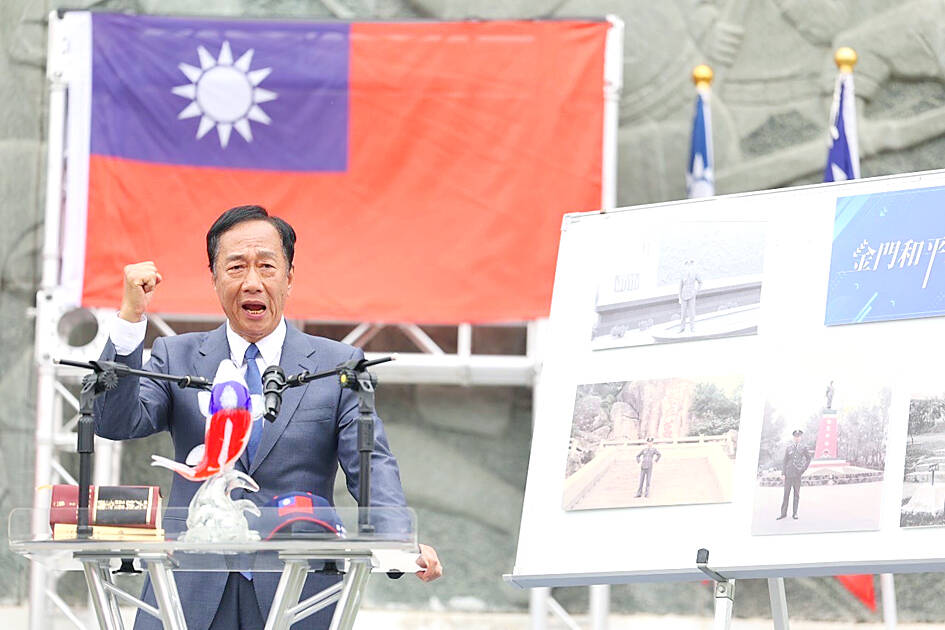Hon Hai Precision Industry Co founder Terry Gou (郭台銘) yesterday said he would restart negotiations with Beijing on the basis of “one China, with different interpretations” that reaffirm the foundations and stance of the Republic of China (ROC) if elected president next year.
Gou, who is vying for the Chinese Nationalist Party (KMT) presidential nomination, said he would use Kinmen as the location for negotiations.
Gou made the remark during a visit to Kinmen yesterday, in what he called a “peace declaration.”

Photo courtesy of Gou’s office via CNA
It is the People’s Republic of China (PRC) that says: “We are all Chinese” and “Both sides are one big family,” Gou said.
The PRC demonstrates hostility with its military exercises, he said.
However, Beijing’s actions are not targeting Taiwanese, but when they do, they are reactions to provocations by the ruling Democratic Progressive Party (DPP).
The “1992 consensus” states that there is one China, with each side of the Taiwan Strait having its own interpretation of what “China” means,” but “one China” and “each side having its own interpretation” are equally important, he said.
The so-called “1992 consensus,” a term former Mainland Affairs Council chairman Su Chi (蘇起) in 2006 admitted making up in 2000, refers to a tacit understanding between the KMT and the Chinese government that both sides of the Strait acknowledge there is “one China,” with each side having its own interpretation of what “China” means. The DPP has never acknowledged the existence of the “1992 consensus” or “one China” consensus.
The consensus is the foundation for cross-strait talks, which were ongoing over the past two decades, but have ceased since relations regressed and both sides are preparing for war, Gou said.
This is because the DPP has made subtle changes to the consensus, saying that there are “two Chinas,” or “one China, one Taiwan,” or “one country on each side,” he added.
While spreading these slogans, the DPP has created discord among different ethnicities and torn Taiwan apart, he said.
The ROC and what it stands for must remain strong, a conviction that would assuage Beijing that Taiwanese independence is a non issue, removing the need for military harassment and affording both sides the time they need to hash out respective definitions of “China,” Gou said.
In response to Gou’s allegations that the DPP is provoking China with its policies, the Mainland Affairs Council yesterday said that the government has stood by principles of non-provocation and non-capitulation for the past seven years.
Taiwan would not tolerate any statement that Beijing makes under the threat of force, it said.

Taiwan is to commence mass production of the Tien Kung (天弓, “Sky Bow”) III, IV and V missiles by the second quarter of this year if the legislature approves the government’s NT$1.25 trillion (US$39.78 billion) special defense budget, an official said yesterday. Commenting on condition of anonymity, a defense official with knowledge of the matter said that the advanced systems are expected to provide crucial capabilities against ballistic and cruise missiles for the proposed “T-Dome,” an advanced, multi-layered air defense network. The Tien Kung III is an air defense missile with a maximum interception altitude of 35km. The Tien Kung IV and V

The disruption of 941 flights in and out of Taiwan due to China’s large-scale military exercises was no accident, but rather the result of a “quasi-blockade” used to simulate creating the air and sea routes needed for an amphibious landing, a military expert said. The disruptions occurred on Tuesday and lasted about 10 hours as China conducted live-fire drills in the Taiwan Strait. The Civil Aviation Administration (CAA) said the exercises affected 857 international flights and 84 domestic flights, affecting more than 100,000 travelers. Su Tzu-yun (蘇紫雲), a research fellow at the government-sponsored Institute for National Defense and Security Research, said the air

A strong continental cold air mass is to bring pollutants to Taiwan from tomorrow, the Ministry of Environment said today, as it issued an “orange” air quality alert for most of the country. All of Taiwan except for Hualien and Taitung counties is to be under an “orange” air quality alert tomorrow, indicating air quality that is unhealthy for sensitive groups. In China, areas from Shandong to Shanghai have been enveloped in haze since Saturday, the ministry said in a news release. Yesterday, hourly concentrations of PM2.5 in these areas ranged from 65 to 160 micrograms per cubic meter (mg/m³), and pollutants were

Taiwan’s armed forces have established response protocols for a wide range of sudden contingencies, including the “Wan Chun Plan” to protect the head of state, the Ministry of Defense (MND) said today. After US President Donald Trump on Saturday launched a series of airstrikes in Venezuela and kidnapped Venezuelan President Nicolas Maduro, concerns have been raised as to whether China would launch a similar “decapitation strike” on Taiwan. The armed forces regularly coordinate with relevant agencies and practice drills to ensure preparedness for a wide range of scenarios, Vice Minister of National Defense Hsu Szu-chien (徐斯儉) told reporters before a